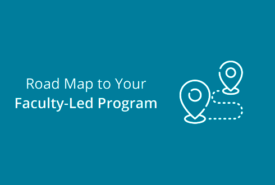
Ensuring your students have the ultimate study abroad experience requires your study abroad program and faculty to be involved before, during, and yes, even after the program has ended. Take a look at these ten ways to guarantee you can deliver the best study abroad program for your students.
Before They Go
1. Send out helpful resources and materials
Help your students feel like they’ve ticked all the boxes before going abroad, by providing them with some pre-departure materials related to their study abroad program.
A few examples:
- Packing lists – Depending on where they’re headed and the duration of their program, you should provide them with a general packing list that will have them covered (literally), for their time abroad.
- Financial tips – Surprisingly, not many students look much into how they will be spending abroad, what the currency conversion rate is and how they will be able to control their costs. A rundown of the current exchange rate, along with recommendations for travel credit cards, and instructions on how to contact their bank regarding foreign transaction fees, will help the students be able to start their program without the stress of unexpected financial issues.
- City guides – An intro guide to their new city and neighborhood in which they will be staying, will undoubtedly ease some of the anxiety that is normal when it comes to gearing up for a study abroad program.
2. Organize time to have 1-to-1 chats if needed
When you are sending out your pre-departure materials to your students, include in your message that you are available to talk via email or set-up phone calls if they would like to talk through any of their questions or concerns before heading abroad. The relief of knowing they will have experienced before and during their program will put many students at ease.
3. Set up a group Facebook page
A great way to introduce all of your program students to each other prior to meeting in person, is to set up a program Facebook group. This will allow students to have a forum with their peers where they can post questions before and during their study abroad program.
During The Program
4. Assist in setting up European phone plans
We would recommend informing students in advance of their arrival of any phone plans that your program or university is including or has a special deal in place that they have the option of purchasing. Additionally, it is important that they are aware if they want to insert a foreign SIM card into their American phone, they will likely need to have their phone unlocked by their current carrier prior to going abroad.
With all of that being said, once students arrive in their study abroad city, it should be a priority within the first several days to get students set-up with temporary phones and/or SIM cards. This is helpful for them as they can use their phones to assist navigating and researching while they’re out exploring, but also for your program as you will have a working phone number to contact them at.
5. Require students keep a journal (or blog)
Requiring students to keep a journal may sound like a tall order, but we can promise that your students will thank you for it in the future. Studying abroad is a tidal wave of new experiences, sensations and emotions all at the same time, and although pictures will help capture their memories, the process of documenting their time abroad through their own words will be a cherished momento once they have returned home.
In today’s world this could also be a blog or digital diary instead of a handwritten journal. Either way, we highly recommend that all study abroad students document their experience in one way or another.
6. Include cultural and recreational excursions
Outside of the classroom there is a plethora of opportunity to have your students experience the culture of their study abroad destination. Studying in Italy? Try truffle-hunting or olive oil tasting. France? A traditional french cooking class. The options are truly endless and allow your students to experience the country’s unique culture while having some fun. These options can be included in their program fees or students can be given the option to sign-up.
7. Arrange affordable options for weekend getaways
In addition to the cultural excursions we just mentioned, there is the opportunity to arrange weekend getaways both within the study abroad country and throughout Europe that will add value to your program. Students can sign-up and pay for these weekend trips that can include as much or as little as you choose to organize.
These trips not only add value to your program and enhance your student’s time abroad, but they also provide an added level of security for your program as you know your students are safely traveling on trips you have planned.
Interested in learning how 4.0 Tours can assist your program with optional or included weekend tours? Submit your contact information below for a free call with a 4.0 Tours manager.
8. Provide opportunities to immerse in the local culture
Furthermore, your program should strive to have students who are interacting and immersing themselves in the local culture as frequently as possible. You can set-up language exchange nights with students from local universities, or organize recreational sports nights where students can partake in the activity. The more that your students are exposed to the local culture and language, the great benefit they will obtain from their time abroad.
After They Return Home
9. Add students to study abroad alumni groups
Just because your study abroad program has ended, doesn’t mean your relationship with your students has to! Continue the relationship and their connection to your study abroad program by adding them to alumni networking groups on LinkedIn or Facebook, as well as adding their email address to future communications targeted for former students.
10. Tap previous students to write about their experience abroad
Reach out to recent students and see if they’re interested in writing blog posts to share on your program website. This helps students who are looking to have their work published online and add more program involvement to their resume, as well as help future students who are considering studying abroad through your program.
Program Development
Road Map To Your Faculty-Led Program

Planning your faculty-led study abroad program and don’t know where to start? As experienced tour providers, we’ve laid out your first three, simple steps that you need to begin thinking about for your program. Download our Road Map to Your Faculty-Led Program to get started today.

